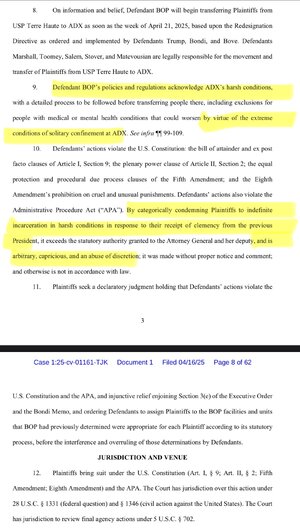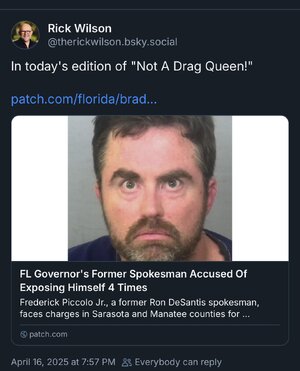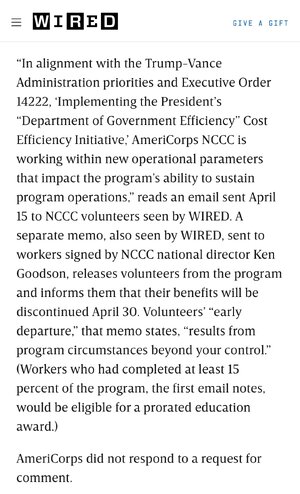Navigation
Install the app
How to install the app on iOS
Follow along with the video below to see how to install our site as a web app on your home screen.
Note: This feature may not be available in some browsers.
More options
You are using an out of date browser. It may not display this or other websites correctly.
You should upgrade or use an alternative browser.
You should upgrade or use an alternative browser.
CURRENT EVENTS - TAX DAY - April 19
- Thread starter nycfan
- Start date
- Replies: 164
- Views: 3K
- Politics
- Status
- Not open for further replies.
- Messages
- 37,911
FEDERAL WORKERS ARE FACING A NEW REALITY
The problem for government employees isn’t just low morale. It’s the manufactured chaos.
 —> Federal Workers Are Facing a New Reality
—> Federal Workers Are Facing a New Reality
“… I spoke with 24 employees at 14 federal agencies for this story, most of whom are still employed and have requested anonymity for fear of retaliation from the Trump administration. Uniting them is an overwhelming sense of despair. “We’re all in public service because we like helping people,” one Missouri-based Social Security employee told me. “What they’re trying to do is break our spirit.”
… Federal workers are accustomed to the quadrennial ebb and flow of agency leadership and the accompanying shifts in priorities. But this time, “it’s like a psyop—they’re after you; you’re the enemy,” a senior Foreign Service officer stationed abroad told me.
The problem isn’t just the low morale. It’s the dysfunction.
… Other researchers studying cancer, neurological disorders, and developmental dysfunction haven’t been able to access the lab animals they need for genetic testing. “We have the capacity for literally millions of mice on campus,” a federal contractor at the National Institute of Mental Health (NIMH) told me (later updating the estimate to “thousands”), “and currently, there’s only one person left on campus who’s allowed to order animals. They fired the rest.”
On Thursday, NIH employees received an email indicating that their purchasing authority would soon be restored. “Huge relief,” a senior scientist at the National Cancer Institute (NCI) texted me. But given the budget cuts, hiring freeze, and personnel shortage, the scientist added, that “doesn’t mean things are back to normal.”
…
One of the crown jewels of American government—the world-renowned research-and-development capacity that, back in 1989, discovered the hepatitis C virus and earlier this month announced progress on a breakthrough cancer treatment—is losing its luster. The United States is on the cusp of an unprecedented brain drain: Thanks to other actions by the Trump administration, academic posts are scarce, and the private-sector job pool is already swollen with government refugees. Established NIH scientists told me that they’ve been counseling younger scientists, students, and recent graduates to seek work abroad, where government funding for research is more reliable. “People won’t come here to train; they’ll go to Europe,” the NIH retiree told me. “And China is going to kick our ass.”
For him, the stakes of this upheaval are obvious: “How I lost my job is trivial compared to the fact that people will die because of this.”
… At the CDC, administration officials have also ordered federal workers to remove not only their pronouns from professional accounts, but also relevant degrees and qualifications and nonapproved pictures, according to one contractor there. A second Foreign Service officer told me that his team was asked to remove any use of the singular they, in favor of s/he, and their, in favor of his/her.
That’s in addition to the work of scanning and scrubbing webpages, grants, and contracts for any mention of DEI-related words. (An incomplete list reviewed by The New York Times last month suggested that banned words should include such contentious terms as historically and women.)
… Across the government, hundreds of human-resources staffers—including those whose entire job is to manage employee-retirement benefits—have been dismissed, portending trouble for the unprecedented wave of forced retirees. Where it may once have taken a few weeks for an employee to start receiving benefits, some expect it will now take six months or more.
… Many of the scientists at the NIH could find work in the private sector. They could make a higher salary working in agriscience or the pharmaceutical industry, but they’re devoted to the kind of high-risk, high-reward research that only federal resources can facilitate. “It’s one of the things that really made me patriotic—that America was the leader of this,” the Bethesda-based NIH scientist told me, before pausing for a moment.
He and so many of the employees who remain are wrestling with a dilemma: Get out now, and spare themselves several more years of stress and contempt—or stay, to keep plugging away on the projects to which they have dedicated, in some cases, most of their life.
“You’ve talked to a lot of people,” the scientist said to me at last. “What do you think is the right thing to do?” …”
- Messages
- 37,911
Internal budget document reveals extent of Trump’s proposed health cuts
HHS would be asked to absorb a $40 billion cut, about one-third of its discretionary budget.Gift
“… The HHS budget draft, known as a “passback,” offers the first full look at the health and social service priorities of President Donald Trump’s Office of Management and Budget as it prepares to send his 2026 fiscal year budget request to Congress. It shows how the Trump administration plans to reshape the federal health agencies that oversee food and drug safety, manage the nation’s response to infectious-disease threats and drive biomedical research.
The 64-page document calls not only for cuts, but a major shuffling and restructuring of health and human service agencies. …”
- Messages
- 37,911
I assume none of these guys is at all sympathetic (well, who knows but unlikely) but that doesn’t mean that the entire group should be assigned to solitary in our Lex Luthor Supermax for the rest of their lives … probably not a case anyone will waste much political capital on but a rotten act in response to anger that Biden denied Trump the immediate opportunity to oversee a bunch of federal executions.


- Messages
- 37,911
- Messages
- 37,911
- Messages
- 37,911
“… The Republican congresswoman bought tens of thousands of dollars in stock from various high-profile companies just before President Donald Trump announced a 90-day pause on his international tariffs and sent the market soaring.
… In a statement to The Associated Press about her recent stock purchases, Greene said, “I have signed a fiduciary agreement to allow my financial advisor to control my investments. All of my investments are reported with full transparency.”
Members of Congress have up to 45 days to disclose stock purchases, meaning Greene might not be the only one to have taken advantage of the tariff-induced fluctuation. …”
- Messages
- 37,911
Leading Nutrition Scientist Departs N.I.H., Citing Censorship
Kevin Hall said his work on ultraprocessed foods has been “hobbled” under the Trump administration. Scientists have been raising such concerns for months.
Leading Nutrition Scientist Departs N.I.H., Citing Censorship
Kevin Hall said his work on ultraprocessed foods has been “hobbled” under the Trump administration. Scientists have been raising such concerns for months.
“…
Dr. Hall had planned to keep doing this work for many years — and hoped it might accelerate under the health secretary, Robert F. Kennedy Jr., who has said that fixing the nation’s food supplyis a priority. But now, at 54, he is retiring early.
In an interview with The New York Times, Dr. Hall said his decision was driven in part by several instances in which federal officials censored his work. In one, he said he was barred from speaking freely with reporters about a study that might have been seen as contradicting Mr. Kennedy’s stance on the addictive nature of ultraprocessed foods, which include products like chicken nuggets, hot dogs, packaged cookies and chips.
“We experienced what amounts to censorship and controlling of the reporting of our science,” Dr. Hall said, adding that he was worried that if he stayed, officials might also interfere with the design and execution of his studies.
“That would make me hate my job every day,” he added. …”
- Messages
- 37,911
“… [Hall was forced to take his name off a paper he co-authored with University professors because part of the paper addressed “health equity” (lack of access to healthy food), then …] In March, Dr. Hall and his colleagues published a study that hinted that ultraprocessed foods were not addictive in the same way as some drugs.Leading Nutrition Scientist Departs N.I.H., Citing Censorship
Kevin Hall said his work on ultraprocessed foods has been “hobbled” under the Trump administration. Scientists have been raising such concerns for months.

Leading Nutrition Scientist Departs N.I.H., Citing Censorship
Kevin Hall said his work on ultraprocessed foods has been “hobbled” under the Trump administration. Scientists have been raising such concerns for months.www.nytimes.com
“…
Dr. Hall had planned to keep doing this work for many years — and hoped it might accelerate under the health secretary, Robert F. Kennedy Jr., who has said that fixing the nation’s food supplyis a priority. But now, at 54, he is retiring early.
In an interview with The New York Times, Dr. Hall said his decision was driven in part by several instances in which federal officials censored his work. In one, he said he was barred from speaking freely with reporters about a study that might have been seen as contradicting Mr. Kennedy’s stance on the addictive nature of ultraprocessed foods, which include products like chicken nuggets, hot dogs, packaged cookies and chips.
“We experienced what amounts to censorship and controlling of the reporting of our science,” Dr. Hall said, adding that he was worried that if he stayed, officials might also interfere with the design and execution of his studies.
“That would make me hate my job every day,” he added. …”
When The Times requested a phone interview with Dr. Hall to discuss the study, the N.I.H. denied the request. Several days later, the agency allowed him to answer questions, but only in writing. Dr. Hall said that his responses, which had been sent through an N.I.H. press office, had been edited without his approval in a way that emphasized the study’s limitations and downplayed its significance.
To have federal officials interfere with how the study was portrayed to a news outlet was “galling” and “a huge red flag,” Dr. Hall said.
… In 2019, Dr. Hall published the first clinical trial of ultraprocessed foods, which found that participants on an ultraprocessed diet consumed about 500 more calories per day and gained weight. They lost weight when they were on an unprocessed diet that included foods like grilled chicken, steamed broccoli and pasta. [Results of his follow-up study to try to determine why ultraprocessed foods cause people to overeat is due this summer — he intends to publish the results when available]. …”
——
It is crazy that RFK Jr’s HHS would be censoring Dr. Hall’s work, which would seem to target a key interest of RFK Jr. — at least it would be crazy if you assume RFK Jr is serious about paying attention to science and making good faith attempts at improving health outcomes of Americans.
- Status
- Not open for further replies.
Share:









